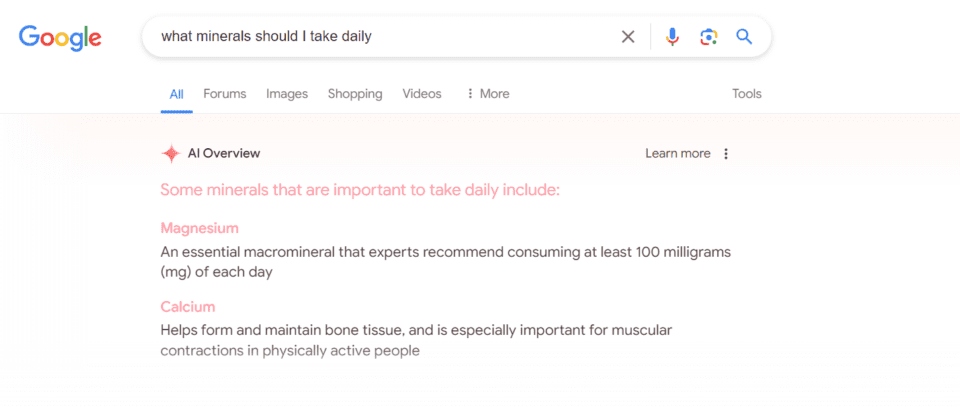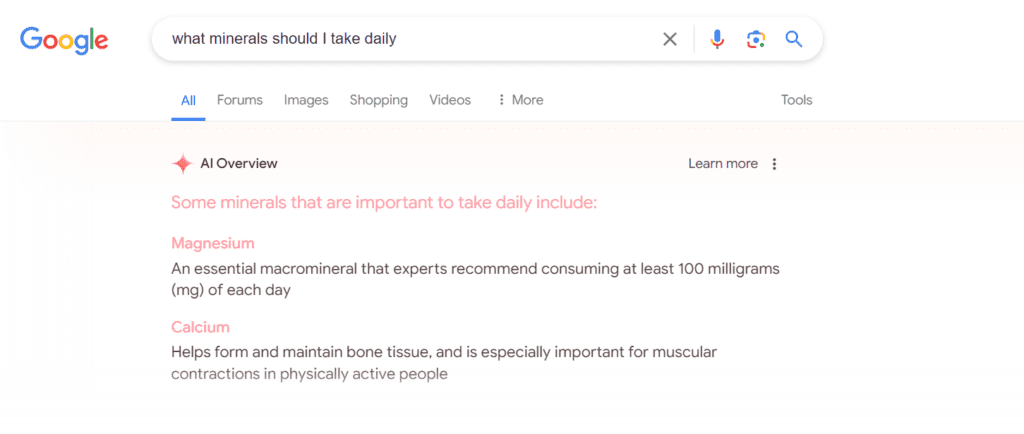Here we go again…so many people crying that “SEO is dead!” because of Google AI Overviews.
It seems to come out of the woodwork every time we see massive changes to their algorithms, SERPs, feature set, etc.
I’m of the opposite ilk. To me, Google’s latest AI-driven SERP features don’t devalue SEO. Yes, they say we could see a loss of upward of 25% of organic traffic.
So that’s why we would give up on SEO altogether? Au contraire!
It means we need to be even BETTER at optimizing for search. I’m not copping out when the going gets tough.
No, it’s time to step up and show our wares. Let’s take a few moments to review the situation further and consider what a more appropriate reaction should be.
The Rise of Google’s AI Overviews
So what are these overviews all about anyway?
Google has been chasing solutions that incorporate artificial intelligence (AI) ever since they introduced semantic search over a decade ago.
That’s right, AI is not a new feature they just cooked up to respond to OpenAI and other platforms that are making them worry of late (Apple, Meta, Bing, etc.).
Remember Hummingbird? RankBrain? Optimizing for search intent? All driven by versions of machine learning and AI.
No they’ve decided to roll AI into the SERPs more proactively. Their AI Overviews show a summary of potential answers to a query, right atop the SERP.
Yes, that’s where they used to feature other items such as organic results, local map packs, and PPC ads. See an example below:

So they are rewarding the most valuable SERP real estate to AI Overviews now. This is what the uproar is all about.
How this AI Feature is Useful
As we all know, AI can serve a huge role in disseminating complex information into clear and concise answers.
This is a great application of it, when it works. As you may have seen, Google has had challenges with the AI recommending things (like eating rocks to get minerals and adding glue to recipes to improve stickiness) that are NOT to be accepted!
That said, AI is helping serve up results that are closer and closer to the search intent, albeit not 100% of the time.
From a user perspective, this can be a huge convenience. You ask a question and the answer pops up on the SERP itself.
You don’t even have to go to a bunch of websites to figure out the full answer.
And that’s the rub, as we’ll get to in the next section…
The Impact on Traditional SEO Strategies
So if users can search for answers and get them right on the SERP, what does that mean for website owners?
Two things:
- You can expect to get less overall organic traffic than before, particularly on content-based queries like “How to’s”
- You need to know how to get featured via the Google AI Overviews sooner or later
That’s right, SEO is still alive and well. But it’s not the same old SEO we used to focus on.
Our content marketing strategies all need to adjust to this new state of affairs.
For example, does your existing content provide clear and concise answers to common queries? Have you even considered this when building out your content plan in the past?
You will have to do so now.
If you get into the overviews, you’ll not only boost your overall online visibility and potential traffic. You’ll also enjoy added credibility for your materials.
And with that add-on, you should be able to maintain a reasonable volume of organic traffic moving forward.
Why SEO Matters More Than Ever
So SEO isn’t dead. It has simply evolved.
You need to evolve as well.
If Google is serving up custom snippets based on search intent, content relevance moves to the front of the line.
Yes, you need to know what keywords you might rank for. Yes, your content needs to be outstanding and unique.
But you have to be relevant to the types of questions users are asking.
And you need to provide the best, most relevant response to those questions.
This is the new way. Is your existing content ready to win in this scenario?
If not, you need to adjust post haste. Google is still ironing out the kinks, but you can rest assured that they’ll figure it out at some point.
Be ready before then.
Conclusion
So now you have a good understanding of WHY Google AI Overviews is changing SEO.
In my next post, we’ll dig further into HOW you can adjust to give them what they want.
Come back next time for actionable tips on how to get in front of this new AI SERP feature. Until then, start thinking about what you might want to adjust on your end, and we’ll follow up next week.
Tommy Landry
Latest posts by Tommy Landry (see all)
- Black Hat AEO Is Here: Google AI Overview Manipulation Is Happening - February 24, 2026
- Where AI Introduces Risk Into Revenue Planning - February 19, 2026
- AI Is Already Influencing Your Forecasting. Do You Know Where? - February 18, 2026





